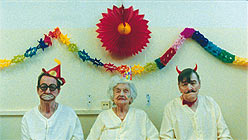When the provocative Austrian director Ulrich Seidl casts his unblinking, unflinching eye on late-stage capitalism, we’d be wise to take in the sobering view. Ostensibly about the degradation of Eastern European wage slaves, Import/Export plays like a coming attraction of our own near future.
With a handful of bleak opening shots, Seidl etches the hard life of a tall, pretty Ukrainian nurse. Olga is dedicated to her work with children, enduring the strapped hospital’s primitive facilities and braving the long winter commute on foot. But she can’t go on supporting her son and mother on cut-back paychecks.
Desperately seeking income, Olga joins a friend who works for a cybersex company, exposing herself via Webcam to the demeaning instructions of anonymous strangers (in Germany and Austria, one gathers). But Olga has too much self-respect — although she never says so — so she stoically kisses her mother and son goodbye and takes the train to Austria in search of menial labor.
Meanwhile, a rough-hewn, short-hair Viennese named Pauli trains to work as a security guard. Part bully, part ignorant youth, he loses his first job when a late-night pack of young drunks trusses him up in the building’s empty garage. With no skills, no experience and no prospects, Pauli has no choice but to make a euro accompanying his stepfather on a vending-machine delivery to the Ukraine.
.


